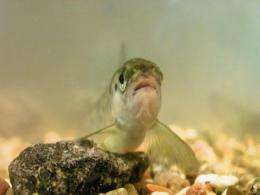July 13, 2012 report
Alaskan researchers find evidence of genetic change in salmon in response to warming climate

(Phys.org) -- Because the gradual increase in temperatures worldwide is still relatively new, researchers have had difficulty in finding examples of genetic changes in organisms that are adapting to the warmer temperatures. Instead they have seen examples of phenotypic plasticity, which is where animals make adaptive changes based on existing conditions that are not brought about by genetic changes. Now though, for the first time, researchers in Alaska have found evidence of genetic changes in pink salmon that have come about over the past few decades as the fish have been migrating upstream earlier than they used to. In their paper published in Proceedings of the Royal Society B, the team describes how they found a genetic marker for late spawning fish diminishing over time as water temperatures increased.
The pink salmon in the study were part of a group that spawns in a stream near Juneau, Alaska. Prior research had shown that the salmon have been swimming upstream to spawn on average two weeks earlier than they did just forty years ago. They also found that average water temperature in the stream had risen one degree during that same time span. To find out if any genetic changes have come about as a result, the researchers turned to a genetic marker that has been bred into some, but not all of the fish during the late 1980’s, that tended to make them spawn a little bit later then the others in their group. Because genetic samples of the fish have been taken on a regular basis since the 1970’s, the team was able to see that the late spawning marker showed a decrease from 20% of the fish population on average to just 10%; a clear sign that genetic change over just a few decades had occurred. At the same time they found no other changes in other genes that had been marked as a control.
The researchers say the evidence shows that salmon have evolved genetically over just a couple of generations which by implication means, that other animals are likely doing the same. Overall, they say, their study shows just how quickly organisms can evolve to deal with ongoing temperature changes. What they don’t know yet, however, is how earlier spawning impacts the fish in other ways, such as when the young fish swim back down stream and on out into the ocean.
More information: Genetic change for earlier migration timing in a pink salmon population, Published online before print July 11, 2012, doi: 10.1098/rspb.2012.1158
Abstract
To predict how climate change will influence populations, it is necessary to understand the mechanisms, particularly microevolution and phenotypic plasticity, that allow populations to persist in novel environmental conditions. Although evidence for climate-induced phenotypic change in populations is widespread, evidence documenting that these phenotypic changes are due to microevolution is exceedingly rare. In this study, we use 32 years of genetic data (17 complete generations) to determine whether there has been a genetic change towards earlier migration timing in a population of pink salmon that shows phenotypic change; average migration time occurs nearly two weeks earlier than it did 40 years ago. Experimental genetic data support the hypothesis that there has been directional selection for earlier migration timing, resulting in a substantial decrease in the late-migrating phenotype (from more than 30% to less than 10% of the total abundance). From 1983 to 2011, there was a significant decrease—over threefold—in the frequency of a genetic marker for late-migration timing, but there were minimal changes in allele frequencies at other neutral loci. These results demonstrate that there has been rapid microevolution for earlier migration timing in this population. Circadian rhythm genes, however, did not show any evidence for selective changes from 1993 to 2009.
Journal information: Proceedings of the Royal Society B
© 2012 Phys.org
















